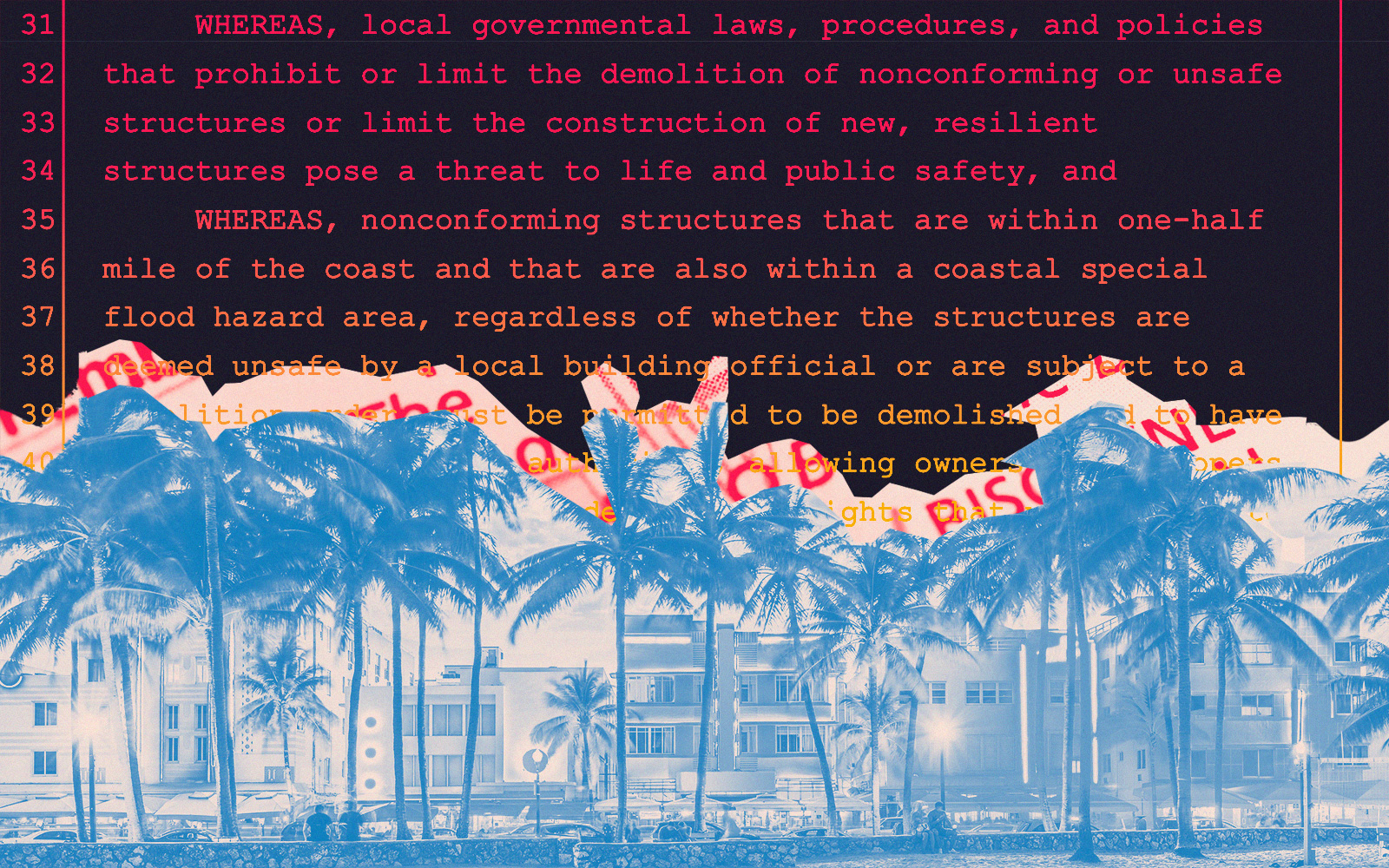Florida Gov. Ron DeSantis signed into law a controversial bill that will make it easier to demolish aging coastal properties, another major win for developers from the Florida Legislature.
Senate Bill 1526 strips local municipalities of their authority to ban, restrict or prevent the demolition of “nonconforming” and unsafe structures. The exceptions are for buildings individually placed on the National Register of Historic Places, contributing structures within a historic district listed in the National Register before 2000, and single-family homes. Buildings in barrier island municipalities with a population of less than 10,000 and which have at least six city blocks that are not located in four specific flood zones (V, VE, AO or AE) are also exempt.
Buildings that only have municipal historic designation would not be saved from the wrecking ball.
DeSantis signed the bill on Friday, more than two weeks after the Florida House passed the bill. It went into effect immediately.
A previous version of the bill died in the Florida Legislature last year.
Buildings are considered nonconforming if they don’t meet the base flood elevation for new construction under the National Flood Insurance Program, if they were found to be unsafe by a building official, or if the structures were ordered to be demolished. Increased scrutiny on building safety has resulted in more buildings being inspected and declared unsafe following the Surfside condo collapse, which killed 98 people in 2021.
The latest law will have the biggest effects in cities such as Miami Beach, where owners of properties in historic districts faced restrictions and were subject to approval regarding renovations, demolitions and other work.
A rush of demolition applications is expected. Some developers have sat on properties in historic districts for years with the hopes that a law like this would be passed or their buildings would be deemed unsafe.
The law could also spur sales of commercial properties that qualify, experts say.
Keith Poliakoff, a partner at Fort Lauderdale-based Government Law Group, said he has received “several calls from developers” who have properties they can now move forward with demolishing. He said the law creates “massive redevelopment implications” for coastal properties in the state.
Under the new law, local municipalities cannot limit the development potential of a site with a nonconforming or unsafe structure; require that the demolished structure be replicated; require the preservation of any of the building’s elements; or impose any requirements that wouldn’t apply to other properties within the same zoning district.
“Developers have been hesitant to buy, attempt to rehab, demolish or build properties that residents deem to be historic, which has created old, antiquated, blighted [areas],” Poliakoff said.
He is drafting demolition applications for at least two developer clients in Hollywood and Miami Beach, which he declined to identify.
“Neither property is on a national historic database, but in both cases the properties have received historic overlays or protections from underlying municipalities which has left these properties in complete disrepair,” Poliakoff added
Opponents of the law said it could encourage property owners to let their potentially architecturally significant buildings deteriorate to the point where demolition would be required by the local building official.
In Miami Beach, for example, the city ordered the demolition of the historic Deauville Beach Resort, despite massive public outcry.
Read more



Many argue the Meruelo family, which owns the now-vacant oceanfront site, let the hotel fall into disrepair to the point where it could not be saved. Members of the city’s historic preservation board warned the “demolition by neglect” would set a dangerous precedent for some property owners. The Meruelos were under contract to sell the site to billionaire developer Steve Ross, but an upzoning referendum tied to the site failed to garner enough votes.
“This will absolutely increase not only the property values, but I have already gotten calls from clients saying ‘What property should I be looking for now that this law passed?’” Poliakoff recounted. “Not only do I believe it will spark sales, I believe we enabled property owners to get the price they deserve for these properties.”
The law adds to other pro-developer legislation that the Florida House and Senate have taken up in recent sessions. Earlier this month, the Legislature passed amendments to the Live Local Act, a law enacted last year that provides zoning and tax incentives to developers that incorporate income-restricted workforce housing into their projects.
